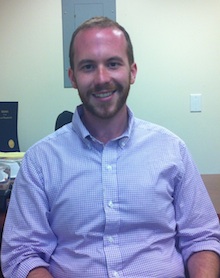

PHILADELPHIA — The year was 2008. Leaving their school newspaper behind, three Temple University graduates went looking for journalism jobs. Freelancing helped pay the bills, but they weren’t having any luck finding the full-time gigs they imagined.
The more they looked, the more it seemed like the kind of jobs they wanted — smart, high-impact, tech-focused local reporting — didn’t really exist. There were local tech writers out there, sure, but the amount of ink spent covering the Philly tech scene didn’t match its recent growth. The news organization this trio wanted to work for didn’t really exist, and the media companies that did exist weren’t really hiring.
So they decided to start their own. With a $50 WordPress theme, Technically Philly was born. It already had a staff, a distribution platform, and a vision fit for a bumper sticker: “A better Philadelphia through technology.”
The question was: How to pay the bills?
Display advertising revenue didn’t seem like a viable option. Grant money could — and ultimately would — help. But the group wanted to find a diverse, sustainable business model.
“We looked at larger entities like TechCrunch and a few other sites that we admire that were doing events,” co-founder Brian James Kirk told me. “It was really about diversification of revenue and just trying to pound the pavement — looking outside of that world for journalism and figuring out how to make it work.”
Today, Technically Philly’s flagship event is Philly Tech Week, an eight-day conference that shows the local tech scene is “alive and kicking ass,” as one Twitter user put it. It’s free for tech companies to participate, and free for anyone to attend. (Revenue comes from sponsors.) This year marked Technically Philly’s second ever Tech Week, and attendance more than doubled to some 10,000 people.
Kirk estimates about 40 percent of the revenue pie comes from events, 40 percent from consulting gigs, 10 percent from ads, and 10 percent from grants. That’s a shift compared with last year, when events revenue only represented about 12 percent of the pie.
Technically Philly’s consulting work has been to help develop web and events strategies for clients like the National Constitution Center in Philadelphia and other companies that have “limited interaction in the tech world” that Technically Philly covers. (If there were any overlap, Kirk says the person covering the company would not be the person consulting for it, and that the relationship would be disclosed to readers as per the site’s ethics policy.)
Technically Philly points to the events-based business model as the foremost reason it has become a profitable business, and that’s the area it will focus on expanding in coming months as it plans to “significantly scale down” its consulting efforts.
 “The big pitch has been that it’s a geographic niche publication,” Kirk said. “That’s what entices our sponsors and that’s what entices our readers because they can’t get that niche anywhere else. Why does it work? I think sponsors immediately react to people in a room. They want to meet people. We essentially see Tech Week as, ‘This is our annual “ask” of the community.’ We try to limit when we do ask businesses for support, and it resonates with the people who are within our community.”
“The big pitch has been that it’s a geographic niche publication,” Kirk said. “That’s what entices our sponsors and that’s what entices our readers because they can’t get that niche anywhere else. Why does it work? I think sponsors immediately react to people in a room. They want to meet people. We essentially see Tech Week as, ‘This is our annual “ask” of the community.’ We try to limit when we do ask businesses for support, and it resonates with the people who are within our community.”
An event of that scale comes out of a surprisingly modest workspace.
Technically Philly’s budget is “definitely under half a million dollars” — closer to a quarter-million, Kirk later says — and the newsroom is in a Temple University building surrounded by classrooms and across the street from City Hall. The space has an administrative feel to it. (From her perch at the front desk, reporter Juliana Reyes is easy to mistake for an office manager.) Yet there are hints of color here and there. An American flag drapes over a cubicle partition. There’s a “Let’s Go Temple” sign on one wall, and a Mark Howe — of Philadelphia Flyers fame — poster on another. In between, printer paper with simple, printed-in-bold sayings: “Nobody Cares About What You Do As Much As You Do,” “Err on the Side of Action,” and “We’re Totally Fucked. I’m Sorry.”
It’s enough room for the lean four-person staff, but Kirk says they’re looking for new office space, something that will better integrate Technically Philly with the scene it covers. They’re also looking for new office space in other cities. Technically Media already expanded with a new site, Technically Baltimore, which formally launched over the summer after a soft roll-out earlier this year. Next month, that site’s hosting the first-ever Baltimore Innovation Week.
“We evaluated about a half-dozen markets,” Kirk says. “Baltimore just made sense because it looks a lot like Philadelphia. The narrative that’s playing out there is something we’ve seen popping out in Philly or on the tip of Philly’s tongue. There is a very similar trajectory. It’s been amazing how many of the conversations are so similar.”
From an editorial standpoint, Kirk says Technically Media tries to combine the sensibilities of a community newspaper with the advocacy of a modern journalism startup. Coverage goes into one of three buckets: Tech business, tech education, and tech-related civics. “So looking at municipal government informed through tech,” Kirk said. “The bigger issue — or the more important one we push on a lot — is open data. And then the other side of it, infrastructure. Are they providing wifi or Internet access to citizens? What does City Council’s access look like?”
Technically Philly has also worked directly with the city. For example, it launched an initiative with the mayor’s office that gave people an SMS-enabled tool to help people find the closest wifi access point. Now that Technically Media’s Philly and Baltimore sites are humming, it plans to expand to two or more additional cities by 2014. Some of the cities in the running as of this writing: Boston, New York, Detroit, and New Orleans. “It could be that we’re focused on those post-industrial cities that really have burgeoning tech communities, or the alternative would be that we’ll look at how the Mid-Atlantic is connected,” Kirk said.
Also high on the Technically Media to-do list is a substantial site redesign, which is scheduled to go live in January. “It’s not the most attractive site right now,” Kirk says. “We’re still running on that same WordPress theme that we bought three years ago. People browse us mobilely, or have tried and given up, because we didn’t have the operating budget for it.”
If all goes as planned, Technically Media will have switched to responsive design in a matter of months. Determining what’s next after that comes down to a simple calculation, Kirk says: “Evaluating what value — what specific value — you provide to the community you cover. What kinds of services or products can you offer? We don’t think we’re doing anything particularly innovative. We just happen to be doing it online.”